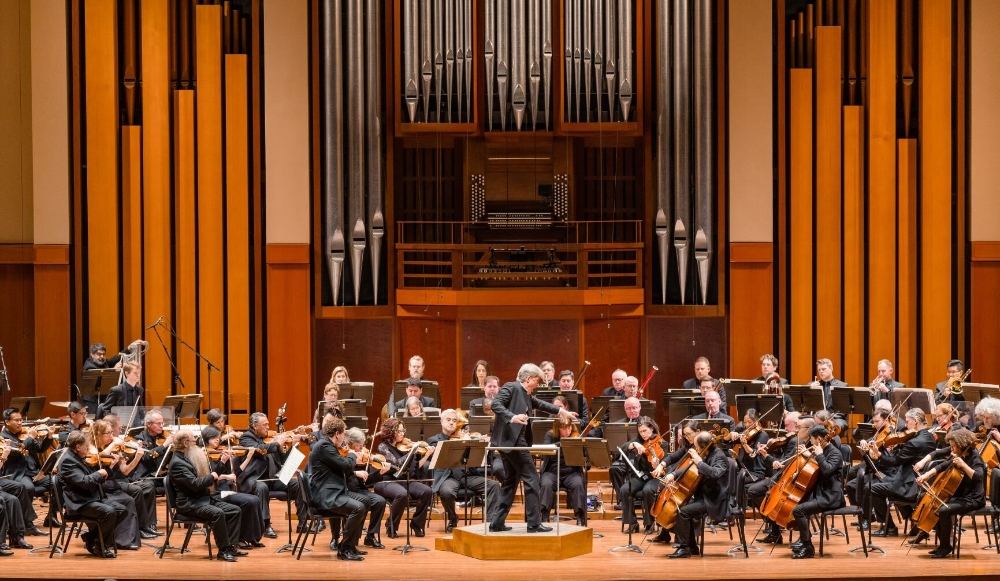What is taking so long for the Seattle Symphony to pick a new music director? All is well and the search committee is busy at work, insists the Symphony brass. Some aspects of the long search can be discerned, however, and a decision might come soon with prime candidates in town, according to a member of the search committee.
One unusual obstacle is the new labor contract with the symphony players, which gives the players a strong vote and veto in any selection of a new music director, in the past usually chosen by the board and donors. Today, most orchestras have a screening process, and every conductor gets rated by the players.
Under the labor agreement with the Seattle Symphony, at least 80% of the SSO players must agree to hold a vote on a proposed candidate. Once that threshold is passed, 60% of that 80% must agree on the candidate. Failure to agree with the players in this way means that the candidate cannot be considered by the search committee and the full board, in effect a veto.
A leader of the musicians’ union explains: “The 80% is the amount of participation from the musicians needed to make a music director’s vote valid. So if we held a vote but less than 80% of the orchestra participated, the vote wouldn’t be valid. With something of this importance, getting well above that threshold is no problem. The 60% ‘yes’ threshold needed is calculated based on just the people who voted.”
This provision is unusual for American orchestras, though the top U.S. orchestras and those in Europe have some similar requirements both for hiring a music director and for hiring new musicians. The New York Times reports that the Vienna Philharmonic “hasn’t had a chief conductor since 1933,” though it has favored ones. One wonders how a symphony orchestra would ever gain a super-majority with such strongly individualistic players.
The new provision replaces an earlier stipulation that merely the majority of orchestra players on the search committee must agree with hiring a candidate. The new hurdle may not prove that hard to clear, since once some of the key top players are excited by a candidate, others may fall in line. And the players’ vote could happen very fast, by Zoom votes, as is often the case with a coveted prospect.
Meanwhile the search committee for a new music director consists of 13 members: five orchestra players, four of whom must be voted to the search committee by orchestra members, plus the chair of the orchestra committee, currently Jeffrey Barker, a flautist, who is automatically on the search committee; plus four board members (including search committee chair Susan Detweiler); and finally four from the senior staff (including general manager Jennifer Adair, who manages the search). I asked for names of the orchestra members, but those names are understandably kept secret, lest conducting candidates curry their favor.
The previous music director for the Seattle Symphony, the admired Danish conductor Thomas Dausgaard, quit suddenly mid-contract and mid-season in January 2022, blindsiding the orchestra. Dausgaard’s tenure was interrupted by the pandemic. In effect the Seattle Symphony has been without firm musical leadership for two-four years, with considerable adverse consequences.
It should be noted that these searches often take 4-5 years to accomplish, given planning schedules, and several major American orchestras are now seeking new leaders, including Chicago, Los Angeles, Cleveland, Salt Lake City, and Cincinnati. The Seattle players seem to like the procession of guest conductors, “which keeps players on their toes.”
Audiences also seem to like the variety, and most guest conductors bring works (“party pieces”) they know well. Meanwhile, important matters such as recruiting new players, setting a consistent style, honing ensemble sound, fundraising by the maestro, and staff retention are jeopardized by long leadership vacuums. Programming too can suffer without strong artistic leadership, as has happened with SSO’s unfocused programming of late. The slow return of live audiences, caused by the pandemic and the state of Seattle’s downtown, only exacerbates these lingering problems.
Peter Herford assisted in researching this article.

Being as polite as possible, THANK YOU David Brewster for providing basic information that the public information arm of the orchestra has not. I get mail from the symphony every week asking me to donate. I’ve never received information from the Seattle Symphony explaining the long wait, any progress, and the mechanisms for choosing a new music director. There have been some VERY exciting guest conductors, but the lack of an artistic rudder and some not so exciting guests have also been in evidence.
One reader asked if these new policies were enacted by contract after music director Dausgaard resigned, and the answer is yes. The musicians’ orchestra committee replies: “The current contract was negotiated Spring 2023 and ratified in July, and the previous arrangement was a one-year agreement negotiated Spring 2022. Both included music-director-related language and both were negotiated after Dausgaard resigned in January 2022.”
All is not well in the SSO institution. A reporter should deeply investigate the leadership: management and the board.
Appreciate the update David Brewster, but I still feel uniformed.
Here’s hoping they hire a dynamic Music Director soon. Many of us won’t subscribe again until there’s a clear and serious artistic direction — with stellar programming that has more than favorite old chestnuts.
Investigate leadership. Not of the senior team but the man at the top: Krishna T. It all starts and ends with him and the highly toxic culture he has created. A cancer needs to be removed before it festers and becomes terminal.
Agree. Hopefully a reporter can dig a little?
Thanks, the silence has been deafening. I do think this year’s programming, with all the different conductors, is a good way to fish and shows some pizzazz.